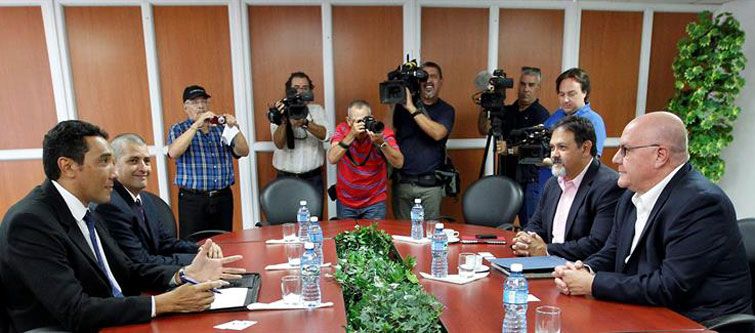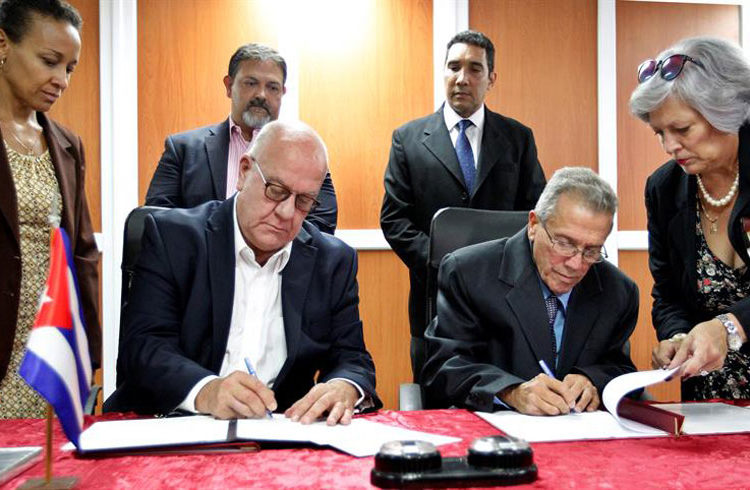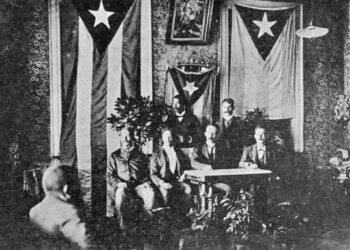The Port of Houston Authority last week signed in Havana a Memorandum of Friendship and Commercial Cooperation with the Cuban maritime authorities. It is the first bilateral agreement at this level since President Donald Trump’s announcements last June.
Ricky W. Kunz, chief commercial officer of the Port of Houston Authority, signed the agreement for the Texas port, while Captain José Joaquín Prado, general director of Cuba’s Maritime Administration, did so for the island.

According to what the Cuban Ministry of Transportation released, in addition to generating new businesses and encouraging trade, the document also previews the bilateral exchange of information in areas like services and market studies, as well as training and technological cooperation.
After the signing of the Memorandum, Kunz highlighted the importance of the agreement for both countries and for the Port of Houston in particular.
It is an important agreement because it facilitates trade between Cuba and the United States, specifically in freight transportation from our port, Kunz said.
Kunz advanced that agricultural and livestock products like chicken and rice could get to the island from Houston. It is what we can do at this moment, he said, referring to the limitations imposed by the U.S. trade acts with Cuba.
Last October, Houston Major Sylvester Turner said that the value of the shipments between Texas and Cuba increased to 18.8 million dollars, and added that these exports to Cuba will have a general economic impact of close to 43 million dollars.
In relation to the new policy announced by Trump, the chief commercial officer of the Port of Houston Authority commented that it is still very soon to see the results of these announcements but he said he doesn’t believe they will affect trade in agricultural products.
He affirmed that they plan to continue advancing in that direction, respecting U.S. laws.
Meanwhile, Captain Prado explained that with the agreement signed with Houston the Cuban authorities have already penned eight Memorandums of Understanding with U.S. ports located in states with agricultural, livestock and industrial development, and the intention is to establish new agreements of this type.
“Cuba is interested in developing a prosperous commercial exchange with U.S. ports,” he affirmed. In his opinion, the proximity of Port Houston to the Mariel Special Development Zone could contribute to this aim.
Prado recalled Cuba’s strategic geographic position because of the closeness to its coasts of an important part of international maritime traffic and that it has professional experience, specialized equipment and a legal base suited to the port-maritime activity.
There are also plans to implement a wide-ranging program for the development of port infrastructure for cruise ships and the transportation of freight in different ports in the country.
For the general director of Cuba’s Maritime Management, these are strong points that “facilitate maritime traffic and trade between both countries, in the modality of direct line as well as in that of transfers.”
Cuba has established laws that regulate maritime, fluvial and lacustrine navigation, as well as the activity in ports. It also has a legislation for the protection of the environment and particularly the marine ecosystem.
In addition, the island belongs to the Operative Network of Regional Coordination of Maritime Authorities (ROCRAM) and to other regional instruments and agencies, and meets the standards established by them.
Its ports are certified according to the Ship and Port Facility Security (ISPS) Code.
Before the signing of the Memorandum with the Houston Port Authority, agreements had already been signed with the U.S. ports of Virginia, Louisiana, Lake Charles, New Orleans, Alabama, the Gulf Mississippi and Pascagoula.
Houston is one of the cities with the greatest socioeconomic development in the United States and the most populated in the state of Texas. Its port is a complex of 25-kilometer-long diversified public and private installations located a few hours of navigation from the Gulf of Mexico.
It is one of the ports with the greatest traffic and occupation of the United States in terms of tonnage. A great amount of companies that operate container, bulk, refrigerated, metal, petrochemical shipments converge in it, which is seen by the Cuban authorities as “a potential for bilateral exchange.”
After Trump’s speech in Miami, a delegation from the state of Minnesota, headed by Lieutenant Governor Tina Smith, visited Cuba. During the trip, whose aim was not the signing of a bilateral agreement, the delegation – made up by politicians and businesspeople – met with Cuban officials and farmers to explore business opportunities.
Houston mayor: we want to be ready when the embargo is lifted
Trade between Cuba and the United States is restricted because of the economic blockade that only authorizes certain exports to the island. The sale of U.S. agricultural products can only be carried out through cash in advance payment, which restricts bilateral exchange and affects both the Cuban and U.S. economy.










